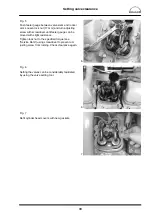
Turbocharger, troubleshooting
86
If oil accumulates in charge-air pipes and intercooler
The very design of the engine causes a small amount of oil to collect in the charge-air system in the form of
oil mist
−
this is perfectly natural and desired.
The oil mist is required to lubricate the intake valve seats.
If more oil accumulates than is normal, i.e. to the extent that oil pockets develop e.g. in the lower air box of
the intercooler, this can lead to “oil disintegration” or uncontrolled engine racing when the oil is separated.
Eliminate the cause in such cases.
Possible causes:
−
The engine is overfilled with oil.
D
Check whether the correct dipstick and guide pipe combination is installed.
−
The engine oil used is unsuitable (see publication “Fuels, Lubricants ...”).
−
The engine is being run on impermissibly steep inclines.
−
The crankcase pressure is to high. This may be caused by a defective oil separator valve (crankcase
breather) or piston ring wear.
Compressor coking
This can occur when the charge-air temperature is permanently high, for example when the engine is con-
stantly run at full load.
Coking lowers the boost pressure but does not negatively affect power output or acceleration performance.
Coking can increase exhaust gas opacity.
In the event of compressor coking:
−
Remove the compressor housing, being careful not to let it get jammed.
D
If it gets jammed, the compressor wheel blades may get damaged or bent, and the resultant
imbalance can ruin the turbocharger.
−
Remove carbonisation in the compressor housing with a suitable cleaning agent.
Danger:
Do not under any circumstances spray in cleaning agent while the engine is running
−
Ineffective
−
Risk of accident!
−
In problem cases, use oil types that are less likely to lead to compressor carbonisation (see publication
Fuels, Lubricants ...”).
Summary of Contents for D 2840 LE 301
Page 1: ......
Page 2: ......
Page 16: ...Notes 14...
Page 20: ...Engine views 18 Engine views D 2842 LE 301 9 10 11 12 9 8 6 5 4 3 2 1 13 14 15 16 17 18 6 7 8...
Page 150: ...Notes 148...
Page 151: ...149 Service Data...
Page 179: ...177 Special tools...
Page 180: ...Special tools 178 2 3 4 5 6 7 8 1 6 1 6 2 6 3 9 1 9 2 9 3 9...
Page 184: ...Special tools 182 21 22 25 25 2 24 25 1 26 27 1 27 2 27 20 1 19 2 19 1 20 2 19 20 28 23...
Page 186: ...Special tools 184 30 29 32 31 33...
Page 193: ......
Page 194: ......
















































